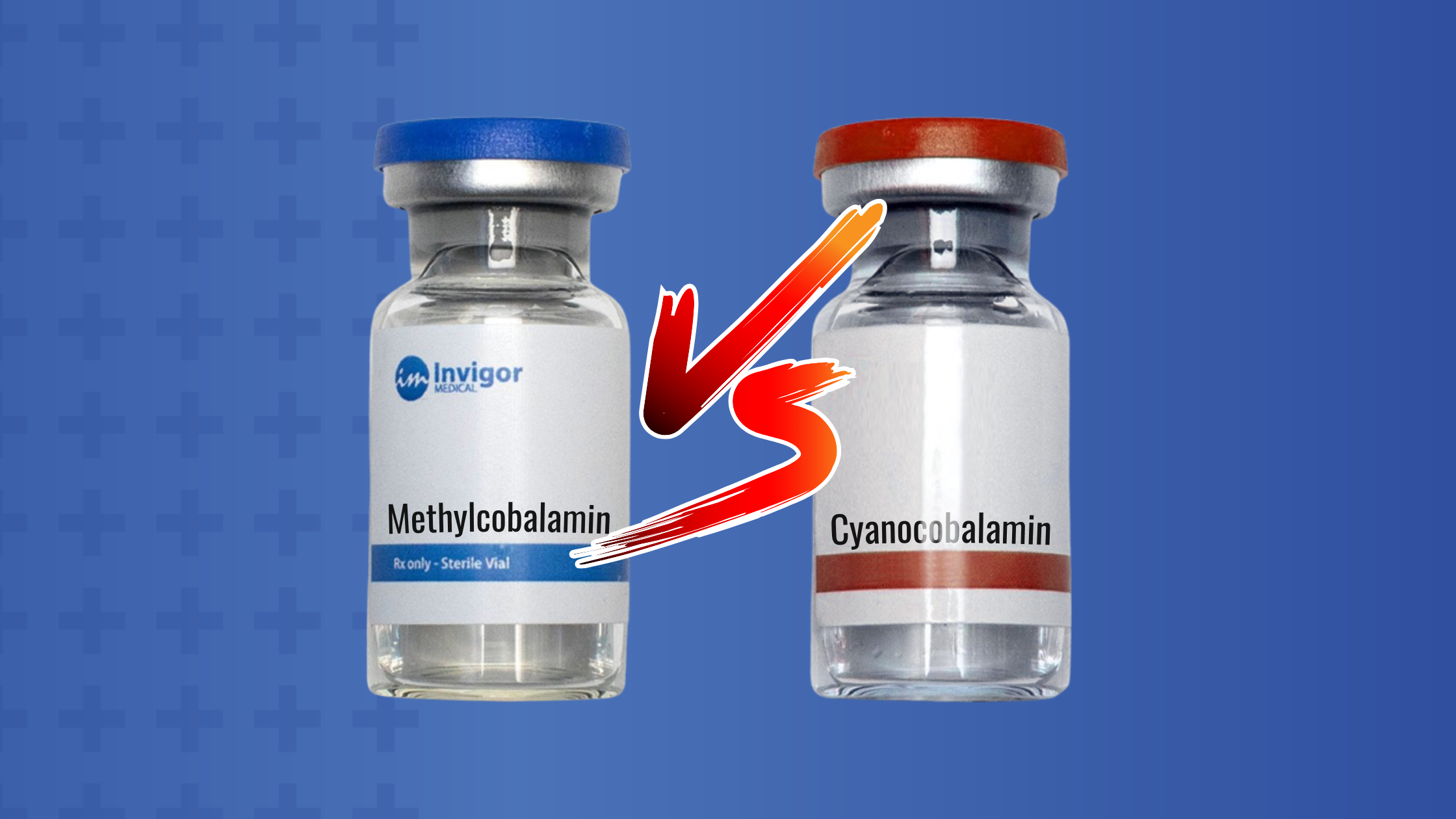Methylcobalamin vs cyanocobalamin is a hot topic for anyone seeking the best vitamin B12 supplement to boost energy, support weight loss, and ease symptoms of aging. While both options offer these shared benefits, methylcobalamin has emerged as the favored choice for its superior bioavailability and targeted wellness support. In this guide, we’ll explore why experts often recommend methylcobalamin over cyanocobalamin and how it can enhance your overall health.

Methylcobalamin vs Cyanocobalamin: A Closer Look at What They Treat
What it Treats
- Supports nerve health and cognitive function
- Improves energy levels and metabolic performance
- Manages symptoms of vitamin B12 deficiency, such as fatigue and memory issues
- Supports red blood cell production and overall blood health
- Improves energy metabolism and combats fatigue
- Manages vitamin B12 deficiency symptoms, including anemia and muscle weakness
How it Works
Main Benefits
- Treats vitamin B12 deficiency by restoring essential nutrient levels.
- Enhances nerve function to reduce symptoms of neuropathy.
- Boosts energy production to alleviate fatigue and improve metabolic performance.
- Supports cognitive health by promoting mental clarity and memory.
- Stimulates red blood cell formation to manage anemia-related issues.
- Treats vitamin B12 deficiency by replenishing vital nutrient stores.
- Alleviates anemia symptoms through improved red blood cell production.
- Boosts energy metabolism to provide rapid relief from fatigue.
- Enhances nervous system function by reducing nerve discomfort.
- Maintains long-term nutrient balance to prevent recurring deficiencies.
Methylcobalamin vs Cyanocobalamin: Dosage, Administration, and Timing Guidelines
Dosing Requirements
- Methylcobalamin is typically administered orally as a tablet or sublingual lozenge, with injectable forms available under medical supervision.
- The typical daily dosage is usually between 500 to 1000 micrograms taken once per day.
- It is best taken in the morning, either with or without food, to maximize absorption and support consistent energy levels.
- It is commonly combined with folate and other B vitamins to enhance its effectiveness in addressing vitamin B12 deficiency.
- Cyanocobalamin is most often administered orally as a tablet or lozenge, with injection options available by prescription.
- The standard daily dosage typically ranges from 1000 to 2000 micrograms taken once daily or as directed by a healthcare provider.
- It is recommended to take cyanocobalamin in the morning with food to improve absorption and maintain steady energy levels.
- It is frequently paired with folic acid and other B complex vitamins to optimize its efficacy in managing vitamin B12 deficiency.
Effect Duration
- Onset Time: Methylcobalamin often begins working within a few hours to 24 hours, offering a fast-acting solution compared to cyanocobalamin.
- Duration of Therapeutic Effects: Its benefits are cumulative, with most patients experiencing sustained improvements after 2 to 4 weeks of regular use, similar to the timeline observed with cyanocobalamin.
- Immediate vs. Cumulative Effects: While some users notice an immediate boost in energy, the full therapeutic impact of methylcobalamin builds gradually over time, a pattern that mirrors the effects seen with cyanocobalamin.
- Noticeable Results: Many patients report subtle improvements within the first week and more significant changes by the end of the second to fourth week, aligning closely with the experiences of cyanocobalamin users.
- Onset Time: Cyanocobalamin typically starts to work within 24 hours of administration, which is comparable to the early onset seen with methylcobalamin.
- Duration of Therapeutic Effects: Like methylcobalamin, its effects are cumulative, with optimal benefits generally observed after 2 to 4 weeks of consistent use.
- Immediate vs. Cumulative Effects: Although some individuals may feel a slight immediate energy boost, cyanocobalamin’s primary benefits are realized gradually as vitamin B12 levels increase, much like methylcobalamin.
- Noticeable Results: Initial improvements can often be noticed within a few days, with more substantial health benefits emerging after 3 to 6 weeks of continuous use, offering a timeline very similar to that of methylcobalamin.
Methylcobalamin vs Cyanocobalamin: Safety and Side Effects Comparison
Side Effects and Safety
Common Side Effects:
- Mild headache
- Mild nausea
- Mild gastrointestinal discomfort
Rare Side Effects:
- Skin rash (moderate)
- Facial or throat swelling (severe)
- Shortness of breath (severe)
Safety Summary: Methylcobalamin is generally safe, with most side effects being mild and temporary; severe reactions are rare.
Threshold for Medical Attention: Seek immediate medical attention if you experience severe allergic reactions, such as swelling, shortness of breath, or persistent chest pain.
Drug Interactions: Methylcobalamin is typically well-tolerated, though it may interact with certain medications or supplements, so consult your healthcare provider if you have concerns.
Common Side Effects:
- Mild digestive upset (e.g., nausea)
- Mild headache
- Mild diarrhea
Rare Side Effects:
- Skin rash (moderate)
- Itching or swelling (moderate)
- Chest tightness or difficulty breathing (severe)
Safety Summary: Cyanocobalamin is generally well-tolerated with most side effects being mild and transient; severe adverse reactions are uncommon.
Threshold for Medical Attention: Seek immediate medical care if you experience severe allergic reactions, including chest tightness, significant swelling, or difficulty breathing.
Drug Interactions: Cyanocobalamin may interact with medications that affect stomach acid or certain antibiotics; always consult your healthcare provider regarding potential interactions.

Methylcobalamin vs Cyanocobalamin: Ideal Candidates for B12 Support
Ideal Candidate
Methylcobalamin is ideal for patients seeking rapid, bioactive support for nerve function and cognitive health.
- Adults aged 30-60 experiencing early signs of neuropathy or mild memory lapses.
- Individuals diagnosed with vitamin B12 deficiency who need quick energy and improved nerve repair.
- Patients with chronic fatigue or cognitive impairments looking for immediate and noticeable improvements.
Cyanocobalamin is best suited for patients requiring a reliable, long-term vitamin B12 supplementation strategy to steadily restore nutrient levels.
- Older adults (50+) with persistent vitamin B12 deficiency who benefit from gradual, sustained supplementation.
- Individuals needing consistent daily support to improve red blood cell production and overall energy.
- Patients with mild gastrointestinal sensitivities seeking a synthetic form that offers dependable, cumulative results.
Methylcobalamin vs Cyanocobalamin: A Final Verdict
Methylcobalamin vs cyanocobalamin comparisons highlight that methylcobalamin’s bioactive form allows for faster absorption and quicker improvements in nerve function and energy levels. While cyanocobalamin offers steady, long-term support through gradual conversion in the body, methylcobalamin delivers more immediate benefits. Additionally, its superior efficacy in enhancing cognitive clarity and alleviating fatigue makes methylcobalamin a standout option. Given these key differences, methylcobalamin emerges as the optimal choice for most patients seeking prompt and effective vitamin B12 support.

